大学英语视听说教案Unit-6
应用型大学英语视听说教程Unit 6 Language
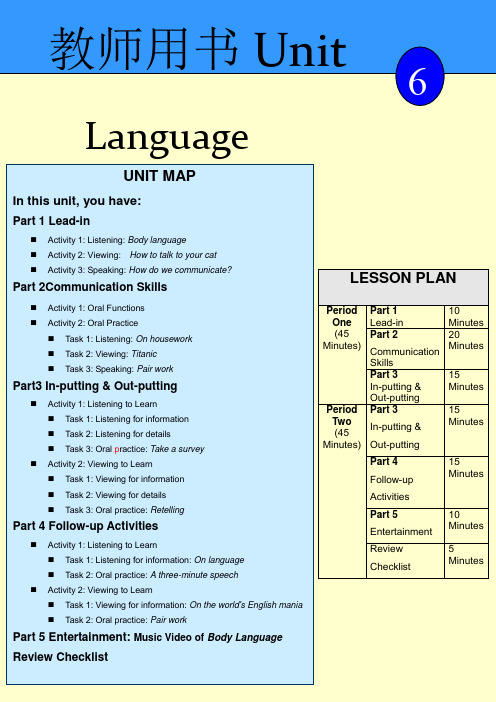
Part 1 Lead-inTeaching tipsHelp the students understand that body language is the type of communication in which a person uses the body, including facial expressions, to react to situations. It will be of great benefit to develop one's ability to read and understand signals and signs of body language as this will help in easily understanding the nature of other human beings and also improve communication with them.ACTIVITY 1 LISTENINGBody LanguageTapescript:Some of us think that what we say (verbal communication) is more important than how we say that. Researches show that we could not be more wrong. Do you know what the numbers 55% - 38% - 7% mean? 55% body, 38% tone and 7% words. How 1 incredible! Non-verbal communication is more important than verbal. We can be saying wise and clever things but if they are not 2 coherent with our body language, no one will believe us. When we are talking to other people we want to be sure that they are listening and understand us, otherwise we are wasting our precious time. We can see whether a person is listening to us by 3 observing their body movements. Let's make an experiment. When speaking to people, observe if:(1). they 4 maintain eye contact(2). their hands are 5 inclined forward(3). they are nodding their heads(4). their feet are pointing towards the speaker(5). they often smile.Check the answers:1. incredible2.coherent3. observing4. maintain5. inclinedTeaching tipsAllow the students to listen to the passage once to get the general idea of the passage. Then let the students listen to the tape again to pay attention to some details.ACTIVITY 2 VIEWINGDirections: Watch the video on How to Talk to Your Cat twice, and decide whether each of the following statements is true or false. If it is false,correct it.Video Transcript:How to Talk to Your CatSure, you talk to your cat now, but does he know what the heck you’re saying? And do you understand his purrs and meow s? If not, it’s time to have a good chat with your furry friend.You will need:o A willingness to look sillyo Attention to pay to his soundso A working knowledge of cat body languageStep 1: Mimic his soundsCreate greater intimacy with your cat by mimicking his meows. Just knowing that you’re attempting to speak his language will make him feel closer to you.Step 2: Use his nameIncrease your chances of your cat listening to you by using his name when you’re issuing a command.Men should use a higher-pitched voice when speaking to their cats, because cats respond better to sopranos.Step 3: Watch your toneLike humans, cats seek clues about a person’s mood by listening to his voice. So when you talk to your cat, be sure that your tone matches the message you want to convey.If you want your cat to know you’re upset that he just peed on the rug, do what his mom would do: Gently pick him up by the scruff of his neck and growl.Step 4: Learn his languageCats have about 100 words in their vocabulary in the form of meows, growls, purrs and hisses. Pay close attention and you’ll begin to learn the sounds he makes when he’s hungry, angry, fearful and so on.Step 5: Read his tailLearn how to read your cat’s tail. If only the tip is moving, he’s irritated. If the ta il is swinging from side to side, he’s PO’d. If he’s carrying his tail tall and proud, he’s happy.Step 6: Interpret speed and volumeFigure out kitty’s mood by paying attention to the speed and volume of his mewling. Fast, loud sounds indicate anxiety, while slow, quieter sounds convey confidence. Did you know, in ancient Egypt, cats were so revered that when one died, the owner placed embalmed mice in the cat’s coffin so he’d have food in the afterlife.Note:PO’d:very angry (slang; not polite)Check the answers:Statements True / False Correct Answers 1. In order to have a good chat withyour cat you only need a willingness to look silly. FalseIn order to have a good chat withyour cat you will need:A willingness to look sillyAttention to pay to his soundsA working knowledge of cat bodylanguage2. When you talk to your cat, be surethat your tone matches the messageyou want to convey.True3. Cats have about 100 words in their vocabulary in the form of meows, growls, purrs and hisses.True 4. Fast, loud sounds indicate anxiety,while slow, quieter sounds indicate intimacy. FalseFast, loud sounds indicateanxiety, while slow, quietersounds convey confidence.ACTIVITY 3 SPEAKINGDirections: Work in pairs, discuss the following questions. Then share your opinions with the whole class.How Do We Communicate?⏹Ask the students to work in pairs, and then ask one or two groups to present theirown discussions.⏹Some ideas for reference:Animals communicate with each other and other species in the same ways we do, through vocalization and body language cues.We can communicate by words, by gestures, symbolic expressions and various other methods of communication. For example the way you walk, your posture, and the clothes you wear can communicate about you to others. Similarly, it is said that a mere cheerful look makes a dish a feast.A person will assume different roles to fit different situations, such as a) when talking to a business associate, b) when talking to an intimate friend, c) when talking to a subordinate, d) when talking to a spouse and e) when talking to a pet dog.Teaching tipsACTIVITY 1 ORAL FUNCTIONSDirections: Read the following sentences. Pay attention to the way of clarification.Help the students know more about clarification:While clarifying doesn’t actually sort out the problem, it does help to ensure that both parties have the same understanding about what the problem is. It also gives each the opportunity to agree or amend their understanding, and in this way enables them to move forward towards a resolution.The difficulty is that when we hear something negative it is human nature to take it as criticism. This immediately puts us on the defensive and/or we start fighting back before really having a full understanding of the issue being presented to us.ACTIVITY 2 ORAL PRACTICETask1ListeningDirections: Listen to the conversation and fill in the blanks.Tapescript:On HouseworkA: I know I don’t help much with the children, but I’m at work all day. It’s such a rush in the mornings and by evening time I’m tired and there’s usually only about an hour before they go to bed. What you forget is that although my wo rk isn’t physical, it is very stressful! I usually spend part of the weekend doing jobs around the house or gardening and shopping with you, and I also play with the children as much as I can.B: So you don’t think my job looking after the children and the home is as difficult as yours and I shouldn’t complain?A: No –I’m not saying that, I think it is a difficult job which you do extremely well. What I’m trying to tell you is why I feel I can’t do much more.B: But do you think I’m being unfair to say you don’t spend enough time with the children?Check the answers:I know; you don’t think; I’m not saying that; What I’m trying to tell you;do you think;Task 2 ViewingDirections: Watch the video clip of Titanic twice. Pay attention to the following two examples of clarification and fill in the blanks.Video Transcript:JACK: Don’t do it!ROSE: Stay back! Don’t come any closer!JACK: Come on! Just give me your hand and I’ll pull you back over.ROSE: No, stay where you are! I mean it! I’ll let go!JACK: No you won’t!ROSE: What do you mean, no, I won’t? Don’t presume to tell me what I will and will not do. You don’t know me.JACK: Well, you would have done it already.ROSE: You’re distracting me. Go away!JACK: I can’t. I’m involved now. You let go, and I’m gonna have to jump in there after you.ROSE: Don’t be absurd. You’d be killed.JACK: I’m a good swimmer.ROSE: The fall alone would kill you.JACK: It would hurt, I’m not saying it wouldn’t. To tell you the truth, I’m a lot more concerned about that water being so cold.ROSE: How cold?JACK: Freezing. Maybe a couple of degrees over. Have you ever, uh, ever been toWisconsin?ROSE: What?JACK: Well, they have some of the coldest winters around. I grew up there, near Chippewa Falls. I remember when I was a kid, me and my father, we went ice-fishing out in Lake Wisota. Ice-fishing is, you know, when you…ROSE: I know what ice-fishing is!Check the answers:Example 1:ROSE: No, stay where you are! I mean it! I’ll let go!JACK: No you won’t!ROSE: What do you mean, no, I won’t? Don’t presume to tell me what I will and will not do. You don’t know me.JACK: Well, you would have done it already.Example 2:JACK: It would hurt, I’m not saying it wouldn’t. To tell you the truth, I’m a lot more concerned about that water being so cold.ROSE: How cold?JACK: Freezing. Maybe a couple of degrees over. Have you ever, uh, ever been to Wisconsin?ROSE: What?JACK: Well, they have some of the coldest winters around. I grew up there, near Chippewa Falls. I remember when I was a kid, me and my father, we went ice-fishing out in Lake Wisota. Ice-fishing is, you know, when you…ROSE: I know what ice-fishing is!Task 3 SpeakingDirections: Work with a partner and then come up with two dialogues that include clarification.Try to use as many as possible of the usefulexpressions and ideas that you learned in this unit.Teaching tipsSample:A: I’m so fed up with the arguments. There’s such an atmosphere - when you walk into the office you can cut it with a knife! I’ve started dreading going to work and on some mornings when I’m getting ready, I actually start feeling sick. She doesn’t seem to be affected by it at all, but I just don’t enjoy my job any more.B: So you’re finding it difficult to go to work because of this woman’s behavior, and it sounds like you’re thinking about leaving?A: No –that’s just it! I used to love my job, and I still love the work. It’s just her that I’m finding difficult. What I want is for her to behave differently.In this instance, while Person A seemed to be saying that she wanted to leave her job, in fact what she was saying that she wanted the situation in the office to change, so that she could once again enjoy her work.Notes:you could cut the atmosphere with a knife: something that you say to describe a situation in which everyone is feeling very angry or nervous and you feel that something unpleasant could soon happen.Part 3 In-putting & Out-puttingACTIVITY 1 LISTENING TO LEARNIn this section, you will hear a passage about baby sign language. Before you listen, think about the following questions:⏹What is baby sign language?⏹Does baby signing help or hinder?Background information:Baby sign language is a method in which you and your infant (or toddler) uses specific handshapes and motions to convey words and meaning (quickly and easily) with each other.Tapescript:Baby Sign LanguagePrior to mastering the art of speech, your baby has great difficulty in communicating his needs to you. This can cause frustration for you both -- yet there is a solution. Baby sign language is rapidly becoming popular as a means of recognizing -- and responding to -- a young baby's needs.Babies can be taught sign language from any age, but they really begin to take notice of the signs from around six months and may begin using them from as early as seven to eight months of age. As many parents will testify, babies understand an awful lot more than they are able to communicate through speech at this stage.Some parents fear that using baby sign language may hamper their child's speech development later on. Research into this subject, however, shows that children taught baby sign in infancy go on to develop superb language skills. In some cases, they may learn to speak earlier and often have an increased ability to learn a second language.There are other benefits to introducing baby sign language - studies indicate that children who sign often develop a higher than average IQ. The major advantage for parents, of course, is to be able to identify their babies' needs and respond appropriately -- easing the frustrations that can lead to tantrums. Once this channel of communication is open, many parents feel that a deeper bond with their child is formed, creating a great sense of harmony.Task 1 Listening for InformationDirections: Listen to the passage once and decide whether each of the following statements is true or false. If it is false, correct it.Statements True/ False Correct Answers1. Baby sign language is becomingpopular as a means of recognizing-- and responding to -- a youngbaby's needs.True2. Babies can be taught signlanguage from any age.True3. Baby sign language hampersbabies’ speech development. FalseResearch shows thatchildren taught baby signin infancy go on todevelop superb languageskills.4. Studies indicate that children whosign often develop an average IQ. FalseStudies indicate thatchildren who sign oftendevelop a higher thanaverage IQ.Task 2 Listening for DetailsDirections: The following sentences are taken from the passage you have just heard. Listen carefully again and fill in the blanks.1. Prior to mastering the art of speech, your baby has great difficulty in communicatinghis needs to you.2. As many parents will testify, babies understand an awful lot more than they are ableto communicate through speech at this stage.3. In some cases, they may learn to speak earlier and often have an increased ability to learn a second language.4. Once this channel of communication is open, many parents feel that a deeper bond with their child is formed, creating a great sense of harmony.Task 3 Oral PracticeDirections: Take a survey. Ask your classmates about their opinions on the importance of body language. Then explain the results of yoursurvey to the class.Teaching tips■Allow students time to share their ideas.■Circulate and help students with vocabulary as needed.More for teachersBenefits of using baby sign languagePromotes the development of language skillsReinforces language skills already developedReduces frustration at not being able to express needsIt is true that eyes are the mirror of the soulThe facts about negative emotions, confusion, not understanding, lying, distracted, non-interest and anger is very well expressed with eyes. If you look away in an airy fairy manner, it clearly suggests you are not comprehending the topic of group discussion.It takes ten seconds to make a first impression and a lifetime to undo itAccording to some studies, 93% of communication is non-verbal. Out of this 55% is through body language and 38% is tone of voice and balance 7% of total communication is verbal. ACTIVITY 2VIEWING TO LEARNIn this section, you will watch and hear Alison Doyle, a Job Searching Guide, talking about the importance of body language during a job interview.Video Transcript:Hi, I'm Alison Doyle for . What you don't say during an interview is as important as what you do say. How you dress, your body language, and your communication skills will all be evaluated by the interviewer. Today I'm going to show you the best ways to use them to your advantage.Job Interview Communication College Journal reports that, according to some studies, body language comprises 55% of the force of any response, whereas the verbal content only provides 7%, and paralanguage, or the intonation -- pauses and sighs given when answering -- represents 38% of the emphasis. To maximize the perceptions you communicate, you want to use these non-verbal impressions to your advantage.Job Interview AttireFirst, consider your interview attire. Surveys show that dressing unprofessionally or untidily is the leading reason that candidates are excluded from consideration. This candidate already has more strikes against her than she can afford: inappropriate clothing, chewing gum, drinking coffee, and overall unprofessionalism. Dressing appropriately in a clean and professional interview outfit can increase your chances of getting a job offer.Nonverbal Communication in InterviewsNonverbal communication is as important, or even more important, than verbal communication. The evaluation of your nonverbal communication will start as soon as you walk into the company's lobby and continue until the interview is finished.Turn off your cell phone before you enter the building. Talking on the phone during an interview is not only disruptive, it's rude.Prepare for the InterviewPrepare answers to typical interview questions in advance, so you're comfortable responding.Job Interview Body LanguageIt's important to make eye contact with your interviewer and to focus on the question. Stay relaxed, but do not laugh or crack jokes at inappropriate times. You should show personality, but don't overdo it because you're nervous or over-eager.Relax and lean forward a little towards the interviewer so you appear interested and engaged. Don't lean back or slump in your chair. You will look too casual and relaxed. Keep your feet on the floor and your back against the lower back of the chair. Pay attention, be attentive, and look interested. Focus on the interviewer, and don’t get distracted.A polished and professional image is what is going to get you to the next stage of the hiring process, a second interview or even a job offer. Thanks for watching. To learn more, visit us on the Web at .Task 1 Viewing for InformationDirections: Watch the talk once and choose the best answer to each of the following questions.Check the answers:1. A2. B3.CTask 2 Viewing for DetailsDirections: In this talk, Alison Doyle gives us several tips on how to speak through appearance and body language in order to create a positiveimpression. Watch the video clip again and write down the tipsmentioned.Check the answers:1. Dress professionally2. Utilize non-verbal communication3. Avoid interruptions4. Come prepared5. Maintain body languageTask 3 Oral PracticeDirections: Work with a partner and use the clues given below to re-create two paragraphs. Student A does the first paragraph, while Student B listens and checks it. Then change roles and continue with paragraph two.1.According to some studies, body language comprises 55% of the force of any response, whereas the verbal content only provides 7%, and paralanguage, or the intonation -- pauses and sighs given when answering -- represents 38% of the emphasis. To maximize the perceptions you communicate, you want to use these non-verbal impressions to your advantage.2.It's important to make eye contact with your interviewer and to focus on the question. Stay relaxed, but do not laugh or crack jokes at inappropriate times. You should show personality, but don't overdo it because you're nervous or over-eager. Part 4 Follow-up ActivitiesACTIVITY 1 LISTENING TO LEARNTask 1 Listening for InformationDirections: In this section, you will hear a passage three times. When the passage is read for the first time, listen carefully for its general idea.When the passage is read for the second time, fill in the blanksnumbered 1 to 8 with the exact words you have just heard. Forblanks numbered 9 to 11, fill in the missing information, using theexact words you have just heard or your own words. Finally, whenthe passage is read for the third time, check what you have written. Tapescript:On LanguageWhen each of you in this room were born, there were 6,000 languages spoken on the (1)planet. Now, a language is not just a body of (2)vocabulary or a set of grammatical rules. A language is a (3)flash of the human spirit. Every language is an old-growth forest of the mind, a watershed, a thought, an ecosystem of spiritual (4)possibilities.And of those 6,000 languages, as we sit here today in Monterey, fully half are no longer being (5)whispered into the ears of children. They're no longer being taught to babies, which means, (6)effectively, unless something changes, they're already dead. What could be more lonely than to be enveloped in (7)silence, to be the last of your people to speak your language, to have no way to pass on the (8)wisdom of the ancestors or anticipate the promise of the children? And yet, (9)that dreadful fate is indeed the plight of somebody somewhere on Earth roughly every two weeks, because every two weeks, some elder dies and carries with him into the grave the last syllables of an ancient tongue.And I know there's some of you who say, "Well, wouldn't it be better? (10) Wouldn't the world be a better place if we all just spoke one language?" And I say, "Great, let's make that language Yoruba. Let's make it Cantonese. Let's make it Kogi." And you'll suddenly discover (11)what it would be like to be unable to speak your own language.Task 2 Oral PracticeDirections: Look carefully at the following cartoons and topics, then pick one of them. Present a three-minute speech on it before your class. Try touse as many as possible of the useful expressions and ideas thatyou learned in this unit.Teaching Tips●Put the students into groups and ask them to prepare for this part before class.●Encourage students to use the Internet and other resources.●Evaluation is necessary after the students’ presentations.ACTIVITY 2 VIEWING TO LEARNTask 1 Viewing for InformationDirections: Watch the video On the World's English Mania. Then answer the three questions below.Background information:Jay Walker explains why two billion people around the world are trying to learn English. He shares photos and spine-tingling audio of Chinese students rehearsing English -- "the world's second language" -- by the thousands.Video Transcript:On the World's English ManiaLet's talk about manias. Let's start with Beatle mania. Hysterical teenagers, crying, screaming, pandemonium. Sports mania. Deafening crowds. All for one idea: Get the ball in the net. Okay, religious mania. There's rapture. There's weeping. There's visions. Manias can be good. Manias can be alarming. Or manias can be deadly. The world has a new mania. A mania for learning English. Listen as Chinese students practice their English by screaming it.Teacher: ... change my life!Students: I will change my life.T: I don't want to let my parents down.S: I don't want to let my parents down.T: I don't ever want to let my country down.S: I don't ever want to let my country down.T: Most importantly ...S: Most importantly ...T: I don't want to let myself down.S: I don't want to let myself down.Jay Walker: How many people are trying to learn English worldwide? Two billion of them.Students: A T-shirt. A dress.JW: In Latin America, in India, in Southeast Asia, and most of all in China. If you are a Chinese student you start learning English in the third grade, by law. That's why this year China will become the world's largest English speaking country. (Laughter) Why English? In a single word: Opportunity. Opportunity for a better life, a job, to be able to pay for school, or put better food on the table. Imagine a student taking a giant test for three full days. Her score on this one test literally determines her future. She studies 12 hours a day for three years to prepare. 25 percent of her grade is based on English. It's called the Gaokao. And 80 million high school Chinese students have already taken this grueling test. The intensity to learn English is almost unimaginable. Unless you witness it.T: Perfect! S: Perfect!T: Perfect! S: Perfect!T: I want to speak perfect English.S: I want to speak perfect English.T: I want to speak -- S: I want to speak --T: perfect English. S: perfect English.T: I want to change my life!S: I want to change my life!JW: So is English mania good or bad? Is English a tsunami, washing away other languages? Not likely. English is the world's second language. Your native language is your life. But with English you can become part of a wider conversation. A global conversation about global problems. Like climate change or poverty. Or hunger or disease. The world has other universal languages. Mathematics is the language of science. Music is the language of emotions. And now English is becoming the language of problem solving. Not because America is pushing it. But because the world is pulling it. So English mania is a turning point. Like the harnessing of electricity in our cities, or the fall of the Berlin Wall, English represents hope for a better future. A future where the world has a common language to solve its common problems. Thank you very much. (Applause)Task 2 Oral Practice1. Directions: Read the following dialogue and discuss with your partner aboutLanguage Learning according to the key points listed in the box.Dashan’s Feelings about Language LearningZhao Wei: You have been in China for so many years, what’s yo ur feeling about living in China? Do you enjoy it?Dashan: Well, actually, I lived in China full time for 7 years, from 1988 to 1995. But now since 1995, I live half in Canada and half in China. I really enjoy that, because I enjoy my work in China and my friends and everything here. But I also enjoy Canada. So I find the best thing for me is to go back and forth, because that way I can continue with my career here and have my normal life in Canada where nobody recognizes me. For me, both of those together are really the best combination.Zhao: I think Chinese people are more familiar with you speaking Chinese, but our magazine needs you to speak English. So it’s lucky for us to hear your English this time. I just wonder which language do you speak more in your daily life, Chinese or English?Dashan:It’s hard to say, because sometimes it depends on what you are doing, whom you are talking with and what subject you are talking about. But I find talking about something very Chinese is difficult to do in English. And also from the opposite way, sometimes trying to explain something about western culture in Chinese is difficult too.Zhao: You are considered a successful foreign language learner, could you share with us your experience in learning foreign languages?Dashan: I studied Chinese for 4 years in my university in Canada. I think one of the things my teacher did very well was to get away from traditional textbooks as soon as possible. We used the standard textbooks for the first 2 years, because you have to learn the pinyin, you have to learn the basic characters and basic grammar. For those things, textbooks are the best, because they are very scientific. Everything is nicely arranged for you to learn in order. But language itself is not like that. In many ways, it’s not really a very scientific thing. I think many people in China who study English have a mistake. They try to use very scientific methods to study something that itself is very unscientific.Key Points in Discussionfeelings about living in Chinadepend onexperiences in learning foreign languages。
新英语视听说教程UNIT6

Exercise 2
Watch the video clip again and answer the questions below. 1. What is Sierra Madre known for?
It’s natural beauty and panorama of the Copper Canyon.
Never refuse and invitation. Never resist the unfamiliar. Never fail to be polite. Never outstay your welcome.
Exercise 2
Listen and fill in the missing information.
places of historic interest and scenic beauty 名胜古 迹 Sierra Madre马德雷山脉 Copper canyon 铜谷 Tarahumara Indian塔拉胡 马拉族印第安人 Chihuahua墨西哥奇瓦瓦 州
Sierra Madre Tourism
Ecotourism: A Different Way to Travel
Listen to the passage and answer the following questions. 1. What are eco-tourists like? 2. When does the ecotourism start? And how is it growing now? 3. How can tourists reach Ecuador’s remote Amazon Basin mentioned in the listening? 4. How do the local Achuar guides explain the forest ? 5. What can tourists experience from the ecotourism? 6. What is one thing you could do on your next trip to be more of an eco-tourist?
英语视听说UNIT6 Lead-in.

Video Clip
Lead In
3) Yes/No. According to my experience, fiction stories can bring me into a wonderful world and make me escape from the dissatisfactions in reality, so I can enjoy a period of happy or pleasant time through reading of fiction stories.
Video Clip
Lead In
2) Yes/No. In my opinion, fiction stories are fascinating because we can know many new advances in science and technology, or many impossible things become possible in the near future.
Please watch the video
clip of Harry Potter (I)
and answer the
following questions.
Video Clip
1. Have you ever seen any of the ever-popular fiction film series
Harry Potter?
What is your general opinion of fiction stories?
Lead In
Video Clip
2. How do you believe magic power? No matter whether you have seen this film series or not, could you make a reasonable guess of why the fat boy fall into the snake cage?
视听说教案unit 6
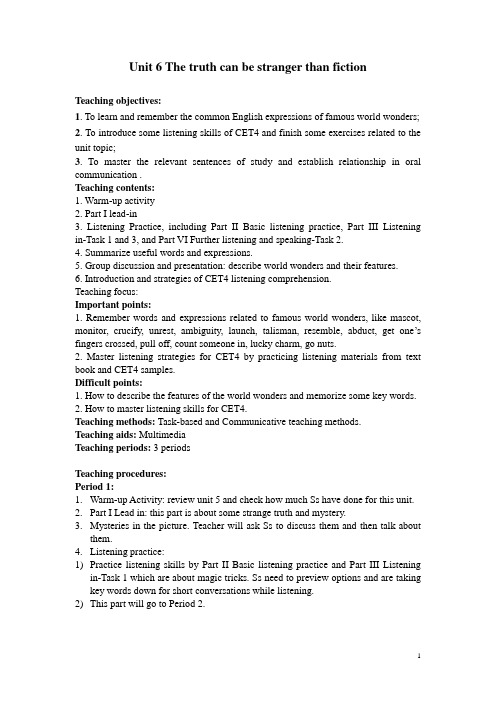
Unit 6 The truth can be stranger than fictionTeaching objectives:1. To learn and remember the common English expressions of famous world wonders;2. To introduce some listening skills of CET4 and finish some exercises related to the unit topic;3. To master the relevant sentences of study and establish relationship in oral communication .Teaching contents:1. Warm-up activity2. Part I lead-in3. Listening Practice, including Part II Basic listening practice, Part III Listening in-Task 1 and 3, and Part VI Further listening and speaking-Task 2.4. Summarize useful words and expressions.5. Group discussion and presentation: describe world wonders and their features.6. Introduction and strategies of CET4 listening comprehension.Teaching focus:Important points:1. Remember words and expressions related to famous world wonders, like mascot, monitor, crucify, unrest, ambiguity, launch, talisman, resemble, abduct, get one’s fingers crossed, pull off, count someone in, lucky charm, go nuts.2. Master listening strategies for CET4 by practicing listening materials from text book and CET4 samples.Difficult points:1. How to describe the features of the world wonders and memorize some key words.2. How to master listening skills for CET4.Teaching methods: Task-based and Communicative teaching methods.Teaching aids: MultimediaTeaching periods: 3 periodsTeaching procedures:Period 1:1.Warm-up Activity: review unit 5 and check how much Ss have done for this unit.2.Part I Lead in: this part is about some strange truth and mystery.3.Mysteries in the picture. Teacher will ask Ss to discuss them and then talk aboutthem.4.Listening practice:1)Practice listening skills by Part II Basic listening practice and Part III Listeningin-Task 1 which are about magic tricks. Ss need to preview options and are taking key words down for short conversations while listening.2)This part will go to Period 2.Period 21.Continue to practice listening skills: 2) Part III Listening in-Task and Part VIFurther listening and speaking-Task 2 which are about views on S uperstitions or real bad luck. Besides preview and key words, Ss also need to judge the speakers meanings by theirs tones.2.Teacher will summarize some useful words and expressions in the selectedlistening materials.3.Teacher will ask Ss to discuss what they have listened in groups and choose one ortwo candidates to express their ideas group by group.Questions which will be offered by teacher:1)How many mysteries do you know? Do you believe in them?2)Is there anybody around you who is superstitious? What’s your opinion aboutsuperstition?3)What would you do when you found something that cannot be explained by truthand science?Period 31.Teacher will introduce new strategies of listening comprehension of CET4,especially news listening and lecture listening.2.Listening practice:1)Take a whole test of the CET4 listening with new forms.2)Group work: surf the internet to find some frequent-use words of news listeningand share in the class.。
视听说-UNIT6-Being-healthy-feels-great!
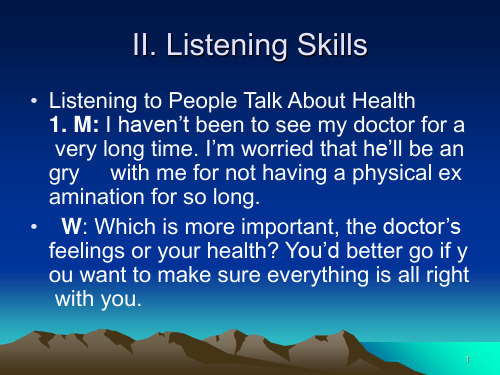
• Many such dieters may end up with very s erious disorders. Princess Diana suffered f rom an excessively strong appetite; Karen Carpenter, a popular singer of the 1970s, died of the less of appetite. You should kn ow that looking good is important but not w hen it comes at he risk of your health and l ife. Better eating habits and proper exercis e are all you need to be fit and look good.
stoms, socializing…even body language a nd gestures are all different from those in my own country.
17
• D: How long have you lived here? • S: Almost three months now. It seems muc
• M: School is important, but so is your hea lth. Maybe you should talk to a doctor. Doc tors see people all the time for this very pr oblem. They can help you.
7
• The woman asks the man to smoke outsid e because she wants to live long and healt hy. She believes secondhand smoke causes cancer too.
新视野大学英语视听说(第二版)第二册 UNIT 6

Lead-in Matching Game Brainstorming Watching and Discussing Acting It Out Fun Time Oral Assignment
Book 2 – Unit 6
Lead-in
Viewing, Listening & Speaking
Fashion
Meaning
1. mini-skirt
A.吊带裙
2. yoke skirt
B. 燕尾服
3. cape dress
C. 超短裙
4. pleated skirt
D. 披肩
5. tuxedo
E. 百褶裙
6. high-heeled shoes
F. 胸针,领针
7. broad-brimmed hat
Book 2 – Unit 6
Viewing, Listening & Speaking
Matching Game
Here are some things for people’s wearing. Work in pairs, try to
identify the associative meaning of them.
露肩装 (low-cut/ low-breast dress) 吊带裙 (yoke skirt)
高跟鞋 (high-heel shoes)
迷你裙 (mini-skirt)
A Sequence Game
Now the class is divided into two groups. In turn each group will give something fashionable until no more items can be provided.
视听说课件Unit 6
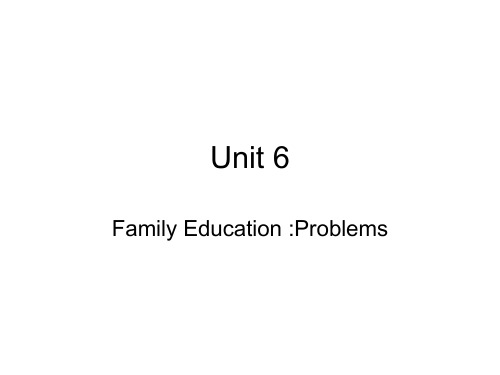
Proverbs(page.65)
• Spare the rod, spoil the child.棍棒出孝子. • spare .v. to not harm or kill somebody or something.饶 恕,宽容. • rod. n. Stick used for hitting people as a punishment.棍 棒. • Like father, like son.有其父必有其子. • As the twig is bent, so grows the tree.上梁不正下梁歪. twig. n. small shoot on the end of the branch.嫩枝 • The child is a chip off the old block.子肖其父 • a chip off the old block---a man or boy who is like his father in character.性格象父亲的人。
Vocabulary Building
• Conscience. n. the ideas and feelings you have that tell you whether something you are doing is right or wrong.良心, 良知. • with a guilty conscience---a bad feeling because you have done something wrong.内疚. • It’s hard to imagine how people live with a guilty conscience. • with a clear conscience ---the knowledge that you have done nothing wrong.问心无愧. • We want to leave with a clear conscience ,knowing we did the job right.
大学英语视听说教程课件 Unit 6 Shopping

D) Below $1,000.
2. A) $70.
B) $140.
3. A) $3.00.
B) $3.20.
4. A) Over $999. B) Over $1,998.
5. A) $140.
B) $70.
C) $35. C) $9.60. C) Over $40. C) $35.
D) $105. D) $15.60. D) Over $100. D) $75.
B. Listen to the conversation again and supply the missing words.
Sally (Salesgirl): Hi, are you being _h__e_lp_e_d__ ? Susan: No, I’m not. I’m interested in some scarves. Sally: All our scarves are in this __s_e_c_ti_o_n_. What do you think of this one here? It’s made of silk. Susan: Hm, it looks __n_i_c_e___, but I’d like to have something __w__ar_m___ for the winter. Sally: Maybe you would like a __h_e_a_v_y__ wool scarf. How about this one? Susan: I think that’s what I want. How much is it?
Part 2 Conversation Listening
Conversation 1
英语专业视听说book 1 Unit 6

Unit 6 Language and Language Learning Vocabulary Building1。
j 2.d 3.h 4.b 5。
f6。
c 7.a 8。
e 9。
g 10。
iPart AListening PriacticeTopic:A Good language Learner -—-Six Short Dialogues and One MonologueListening task 1 ANSWER: 1N 2S 3N 4S 5N 6 Y Listening Task 2Having the recording:1.having learning targets and approaches to it2.being willing to experiment and take risks3.being realistic4.being independent or working independent5.being organized and making proactive use of time and effort6.showing balanced concern for fluency and accuracy in communication Language Follow-up1.purposeful2.adventurous 3。
realistic 4。
independent5organized, proactive 6。
communicativePart BListening PracticeTopic: Learning English in America ---an InterviewListening Task 1Questions asked by the interviewer:1.why did you choose “Stella” as your nickname?2.why did you choose to study journalism in America?3.did you say you had studied English for 10 years?4.Did you find it more difficult to speak English or to write it?5.Has there ever been an occasion when someone ridiculed yourEnglish?Listening Task 21. C 2 D 3 B 4 D 5 CLanguage Follow—up1.I’ve studied English for about 10 years,so there will be no greatlanguage barrier to communication if I choose to study in America。
英语视听说unit6 Let's Talk
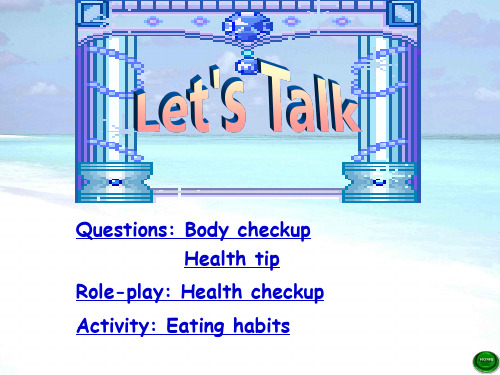
Role-play: Health checkup Activity: Eating habits
Q uestions:
Let’s Talk
Do you do regular body checkups? How about your family members? What’s the importance of regular checkups?
Getting a regular checkup when you're not sick helps keep you healthy.
Health tip:
Most experts agree that if you are healthy, you should get a regular checkup at least twice during your 20s (every 5 years), three times during your 30s (every 3 to 4 years), four times during your 40s (every 2 to 3 years), five times during your 50s (every 2 years), and every year once you reach age 60.
Hale Waihona Puke Role-playSituation: Doctor A gives some suggestions to B based on the test results of a regular Health checkup.
Activity: Eating habits
英语视听说UNIT6 Listening In
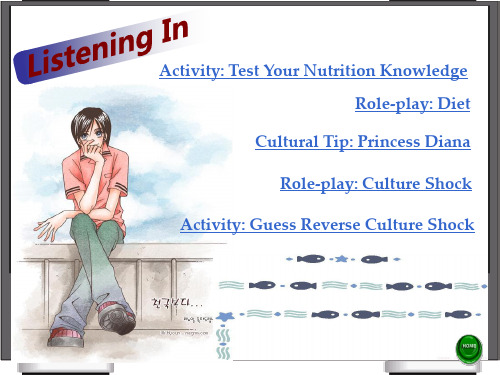
2 Should I take vitamin pills?
Listening In
Not necessarily. If you are active and have a good appetite, you can get a lot of vitamins in your diet. Without a doubt, fruits and vegetables are the best sources of important nutrients.
Role-play
Role-play
Listening In
You are freshmen living away from your parents for the first time. A, who is very fat (or actually very slim), plans to go on a diet and asks suggestions from his /her roommates. His/her roommates offer very different suggestions…
You can also eat extra snacks and larger portions at meals.
6 Is food produced with
chemical fertilizer just as nutritious as food grown with natural fertilizer?
Any other suggestion?
I really need to lose some weight. You’ve got any good idea?
Can you recommend some diet products?
大学英语视听说教案.doc
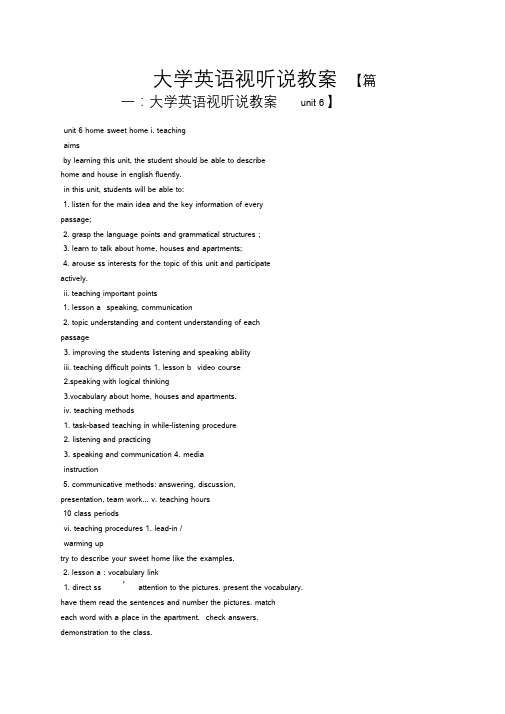
大学英语视听说教案【篇一:大学英语视听说教案unit 6 】unit 6 home sweet home i. teachingaimsby learning this unit, the student should be able to describehome and house in english fluently.in this unit, students will be able to:1. listen for the main idea and the key information of everypassage;2. grasp the language points and grammatical structures ;3. learn to talk about home, houses and apartments;4. arouse ss interests for the topic of this unit and participateactively.ii. teaching important points1. lesson a speaking, communication2. topic understanding and content understanding of eachpassage3. improving the students listening and speaking abilityiii. teaching difficult points 1. lesson b video course2.speaking with logical thinking3.vocabulary about home, houses and apartments.iv. teaching methods1. task-based teaching in while-listening procedure2. listening and practicing3. speaking and communication4. mediainstruction5. communicative methods: answering, discussion,presentation, team work... v. teaching hours10 class periodsvi. teaching procedures 1. lead-in /warming uptry to describe your sweet home like the examples.2. lesson a : vocabulary link1. direct ss ’attention to the pictures. present the vocabulary.have them read the sentences and number the pictures. matcheach word with a place in the apartment. check answers.demonstration to the class.3. lesson a : listening(1). apartment huntingfamiliarize ss with the new words. have them read the newwords aloud after you. explain the task. play the recording.check answers.tell ss to listen again and mark their answers. play therecording. check answers. introduce the topic that the mantalks about three apartments. number the apartments 1 to 3 asyou listen. have ss listen and fill in the blanks with words theyhear. play the recording. check answers. have ss read throughthe questions and possible answers. tell ss to listen again andcheck the correct boxes. play the recording. check answers.(2). a housing problemintroduce the topic :listen to graciela talk to an adviser at herschool. then answer the questions. then tell them to listen andnumber the steps in order. play the recording. check answers.tell ss to listen again and answer the questions. play therecording. check answers.(3). the davis family wants a new home.tell ss they are going to listen to the program “places for rent. ”. direct ss ’attention to the picture anadsk them to readthe questions. tell ss to listen and answer the questions. playthe recording. check answers.tell ss to listen again and fill in the blanks with the words in thebox. play the recording. check answers.(4). make yourself at home!introduce the topic. tell ss they are going to listen to apassage. tell ss to listen carefully and write short answers tothe questions. play the recording.check answers.have ss lookat the pictures carefully. tell them to listen to the recording andnumber the pictures to match them with the explanations. playthe recording. check answers.tell ss to listen again and fill in the blanks with the words theyhear. play the recording. check answers.(5). object-shaped housesdirect ss ’attention to the title. w hat will they hear? present thenew words and have ss read aloud after you. answer anyquestions about vocabulary.with the class, go over the list of questions. tell ss to listenand number the questions in the order they are asked duringthe interview. play the recording. check answers.have ss read the statements. explain that all these statementsare false. tell ss to listen again and correct the statements. playthe recording. check answers.tell ss to listen again and write answers to the questions. playthe recording. checkanswers.4. lesson a : pronunciation1. remind students rising intonation to show surprise. play therecording. have ss work in pairs to practice the conversations.2. have ss listen and read the sentences. play the recording.ask ss to work inpairs to read the sentences. check their pronunciation..5. lesson a : speaking and communicationactivity one1. introduce the situation. how many rooms are there? ask ssto listen and fill in the blanks with the words they hear. play therecording.check answers.2. put ss in groups of three. present the conversations again.ask ss to listen and read along in their groups. play therecording again. ask ss to practice the conversations ingroups. remind ss to keep eye contact with their groupmembers while speaking.3. ask ss to work in groups of three. ask ss to read the modelconversation. answer any questions about vocabulary. ifnecessary, play the recording. elicit or explain to ss who thefamous celebrities are.4. have ss work in groups of three. each student should role-play a famous person. have ss work in their groups to createand practice a new conversation where they introduce eachother. when all groups【篇二:大学英语视听说3-unit1 教案及首页】北华航天工业学院教案unit 1 interests and hobbiesi. dictationask the students to do the dictation of the words in text a unit1.ii. lead-in and video-watchingask the students to work in groups, learn to express likes ordislikes i (don ’t) like ⋯⋯is my favorite. i prefer ⋯to ⋯i care for ⋯⋯is the last thing i would do watch the video and do the exercisesiii. listening skills for short passages1. a few ways to help students conclude the main idea 1).explaining what a topic sentence isusually placed in the beginning, or at the end of a passage, orsome times appears in the middle of the passage where thekey words are frequently repeated. 2). listening for general idearead and analyze the choices first. infer the question. find therepeated words. listen to the passage and pay special attentionto the beginning or the ending part of the passage.2. skill practice: listen to the following three passages andanswer the questionsiv. comprehensive training put the skills into practice1. 5 short conversations and a long conversation2. 1 shortpassage 3. dictationv. assignment1. further listening practice in unit 12. remember the new words, phrases in the listening exercises3. finish the exercises left in unit 1 in students ’textbooks北华航天工业学院教案unit 2. life and fashioni. dictationask the students to do the dictation of the words in text a unit2.ii. lead-in and video-watchingask the students to work in groups, learn to seek advice fromothers how do you feel? what about...?how do you think about ?whats your opinion? what is your view? what do you think? watch the video and do the exercises iii. listening skillsfor short passages1. make the students familiar with different kinds of numbers2.explain how the numbers are tested.3. tips: pay attention to the digit; pay attention to the ways ofreading numbers; pay attention to the use of commas; payattention to the calculation.4. skill practice: listen to the following three passages andanswer the questionsiv. comprehensive training put the skills into practice1. 5 short conversations and a long conversation2. 1 shortpassage 3. dictationv. assignment1. further listening practice in unit 22. remember the new words, phrases in the listening exercises3. finish the exercises left in unit 2 in students ’textbooks北华航天工业学院教案【篇三:《新视野大学英语视听说教程3》课时10 教案】《新视野大学英语视听说教程3》课时10 教案(unit 1 part Ⅱ~unit 1 part Ⅳmodel 1 )授课人:成诚文章大意:墨菲和一个美国人去应聘同一个职位,由于他们学历相同, 所以主管对他们进行了一次测试,结果他们都有一个问题没有回答出来,但最终美国人却被录取,这是为什么呢?(原因:美国人在不会的题目上写的是”我不会”而墨菲写的是”我也是”.★word tips:1.dublin: 都柏林(爱尔兰首都)①(令人吃惊的)巧合,巧事2.coincidence:[ k?uinsid?ns][n] ②同时存在③(意见等的)相同,相符,一致3.bewilder:[ biwild?][v] 使迷惑,使糊涂4.indignant:[ indign?nt][adj] ~(at/about something) 愤慨的,愤怒的,义愤的★words in text:irish[ai?ri?][n] ①爱尔兰语②爱尔兰人[adj] 爱尔兰的,爱尔兰人的,爱尔兰语的文章大意:本文讲述了在应聘时常被问到的一些难题,作者通过本文教你如何去应对这些问题.★word tip:customize:[ k?st?maiz][v]( 以满足顾客的需要)订制,订做,改制★words in text:1.relevant:[ reliv?nt][adj] ①紧密相关的,切题的②有价值的,有意义的①(用于有害事物)面临,遭受(危险或不快)②(用于揭露事实)揭露2.exposure:[iksp?u??][n] ③(用于电视,报章等)(在电视,报纸等上)亮相,被报道④(用于身体状况)挨冻,受寒⑤(用于照相机胶片)⑴(拍依仗照片的)软片,底片,胶片⑵暴光时间时间⑥暴露,显露文章大意:susan 要找工作,但都没有合适的,于是找john 帮忙出主意,那么最终susan选到合适的工作了吗?★word tips:1.job fair:劳务市场2.sue: [sju:] ①要求、请求;控告②控告、起诉3.ad=advertisement: 广告4.update:[v] ①使现代化,更新②向⋯⋯提供最新信息,给⋯⋯增加最新信息5.it=information technology: 信息技术文章大意:susan 即将去面试,向john请教如何才能更好的通过面试.★word tip:fringe[frind?] benefit:[n]( 工资外的)额外补贴,附加福利★words in text:aggressive:[ ?gresiv](line 5)[adj] ①好斗的,挑衅的,侵略的,富于攻击性的②进取的文章大意:helen 所在的公司准备从头开始,招收新人。
新世纪大学英语视听说教程2unit6教案

课程名称:新世纪大学英语视听说教程2授课对象:大学英语二年级学生教学目标:1. 知识目标:- 掌握与Unit 6主题相关的词汇和短语。
- 理解并运用与环境保护相关的表达方式。
- 熟悉环境保护相关的背景知识。
2. 技能目标:- 提高学生的听力理解能力,能够捕捉并理解听力材料中的关键信息。
- 培养学生的口语表达能力,能够就环境保护话题进行简单讨论。
- 增强学生的跨文化交际能力,了解不同文化背景下对环境保护的态度和做法。
3. 情感目标:- 增强学生对环境保护的认识和责任感。
- 激发学生对社会问题的关注和思考。
教学重点:- 环境保护相关的词汇和短语。
- 环境保护话题的听力理解。
- 环境保护话题的口语表达。
教学难点:- 环境保护话题的深度理解和批判性思维。
- 环境保护话题的跨文化交际。
教学准备:- 教学PPT- 相关听力材料- 互动讨论话题教学过程:一、导入(5分钟)1. 利用PPT展示环境保护相关的图片或视频,激发学生的兴趣。
2. 提问:你们认为环境保护对我们来说有多重要?3. 引出Unit 6的主题:Environmental Protection。
二、听力训练(15分钟)1. 播放听力材料,让学生初步理解文章大意。
2. 播放第二遍,引导学生捕捉关键信息,如环境保护的原因、影响和应对措施。
3. 课后作业:根据听力材料,完成相关的练习题。
三、词汇学习(10分钟)1. 引导学生总结听力材料中的关键词汇和短语。
2. 利用PPT展示词汇和短语,并提供例句。
3. 学生分组练习,运用所学词汇和短语进行口语表达。
四、口语表达(20分钟)1. 提出讨论话题:你认为我们应该如何保护环境?2. 学生分组讨论,并选出代表进行发言。
3. 教师点评并给予建议。
五、总结与反思(5分钟)1. 回顾本节课的学习内容,强调环境保护的重要性。
2. 引导学生思考如何将所学知识应用到实际生活中。
六、课后作业1. 完成听力材料的练习题。
2. 撰写一篇关于环境保护的短文。
视听说第二册 UNIT 6

Lesson B Strange dreams
Speaking I don’t think so.
Memory game. Work with a partner. Ask and answer questions, and see who remembers more. Use the expressions of different degrees of certainty.
1. It’s difficult for Galina to pronounce / remember / spell words in English.
Keys
Lesson A How's your memory?
Lesson B Strange dreams
Listson A How's your memory?
Lesson B Strange dreams
Speaking I don’t think so.
Practice the conversation with a partner. Underline the expressions of varying degrees of certainty. Mia: Justin: Mia: Justin: Mia: Justin: Mia: Justin: Mia: Justin: Come on, Justin. Let’s go. The concert starts in an hour. OK. I’m coming. Do you have the tickets? Yes, they’re here in my jacket. Oh, wait a minute. What’s wrong? I can’t find the tickets. They’re not in my pocket. Oh no! Where are they? Are they in the desk? I don’t think so. Try to remember. Maybe they’re in your backpack. Wait … I found them. They were in my other jacket. Let’s go.
商务英语视听说unit6教案

商务英语视听说unit6教案In Unit 6 of our Business English course, we focus on the art of negotiation. This is a crucial skill for any business professional.We begin by examining the principles of effective communication during negotiations. Students will learn how to articulate their needs clearly and confidently.Next, we delve into the strategies for preparing for a negotiation. This includes understanding the other party's position and setting realistic goals.We also explore cultural differences and how they can impact the negotiation process. Being aware of these nuances is key to achieving a successful outcome.Role-playing exercises are an integral part of this unit. Students will practice their negotiation skills in a safe and supportive environment.Feedback is essential for improvement. After each role-play, we provide constructive feedback to help studentsrefine their techniques.Finally, we wrap up the unit with a case study. This allows students to apply their newly acquired skills in areal-world business scenario.By the end of Unit 6, students will be equipped with the skills necessary to navigate complex business negotiations with confidence and competence.。
英语视听说UNIT6 Let's Talk.

f. I would never do this on a normal basis, but for a superstition test... no problem. Besides, $10 is $10!
Group Work
Let’s Talk
Some possible replies and explanations
a. I will probably do this for money as I am not rich. I am superstitious, though!
b. This experiment is distasteful because no one wants to scratch out the eyes of his loved one's picture.
l. I will not try it because I think there's a difference between being superstitious and not wanting to be disrespectful.
out the eyes for ten dollars? (Suggested by
Professor John Stilgoe, Harvard Magazine, (Jan.-Feb. 1996) pp. 36-42. )
Group Work
Let’s Talk
c. See whether you and your partner can do this and explain why.
乐学英语视听说基础教程(下册)教学课件Unit_6

Task 1
Watch the video and choose the correct answers.
1 John’s major is ___B___.
A. Marketing B. English C. Computer Science
2 John’s hobbies include ___A___.
A. dancing
B. jogging
C.boating
3 John has worked for a telecommunications company
for___C___.
A.one year B. two years C.three years
Watching and Practice
Task 2 Watch again and fill in the blanks with what you have heard. John: Hello!(1)I’m interested in the position of assistant manager. Interviewer: Hello. Could you tell me a little bit about yourself? John: Yes. My name is John. My major is English. I can show you my certificates (2)if necessary. Interviewer: OK. Could you tell me something about (3)your hobbies and your character? John: Yes, I like dancing and swimming. I think I am a(n) (4)outgoing, responsible, and careful person.
大学英语视听说教案.doc
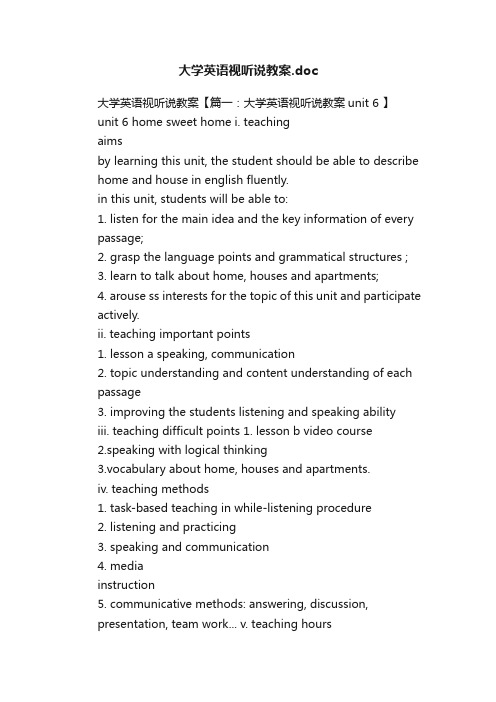
大学英语视听说教案.doc大学英语视听说教案【篇一:大学英语视听说教案unit 6 】unit 6 home sweet home i. teachingaimsby learning this unit, the student should be able to describe home and house in english fluently.in this unit, students will be able to:1. listen for the main idea and the key information of every passage;2. grasp the language points and grammatical structures ;3. learn to talk about home, houses and apartments;4. arouse ss interests for the topic of this unit and participate actively.ii. teaching important points1. lesson a speaking, communication2. topic understanding and content understanding of each passage3. improving the students listening and speaking ability iii. teaching difficult points 1. lesson b video course2.speaking with logical thinking3.vocabulary about home, houses and apartments.iv. teaching methods1. task-based teaching in while-listening procedure2. listening and practicing3. speaking and communication4. mediainstruction5. communicative methods: answering, discussion, presentation, team work... v. teaching hours10 class periodsvi. teaching procedures 1. lead-in /warming uptry to describe your sweet home like the examples.2. lesson a : vocabulary link1. direct ss ’attention to the pictures. present the vocabulary.have them read the sentences and number the pictures. matcheach word with a place in the apartment. check answers.demonstration to the class.3. lesson a : listening(1). apartment huntingfamiliarize ss with the new words. have them read the new words aloud after you. explain the task. play the recording.check answers.tell ss to listen again and mark their answers. play therecording. check answers. introduce the topic that the man talks about three apartments. number the apartments 1 to 3 asyou listen. have ss listen and fill in the blanks with words they hear. play the recording. check answers. have ss read through the questions and possible answers. tell ss to listen again and check the correct boxes. play the recording. check answers.(2). a housing problemintroduce the topic :listen to graciela talk to an adviser at her school. then answer the questions. then tell them to listen andnumber the steps in order. play the recording. check answers.tell ss to listen again and answer the questions. play therecording. check answers.(3). the davis family wants a new home.tell ss they are going to listen to the program “places for rent. ”. direct ss ’attention to the picture anadsk them to read the questions. tell ss to listen and answer the questions. play the recording. check answers.tell ss to listen again and fill in the blanks with the words in thebox. play the recording. check answers.(4). make yourself at home!introduce the topic. tell ss they are going to listen to apassage. tell ss to listen carefully and write short answers to the questions. play the recording.check answers.have ss look at the pictures carefully. tell them to listen to the recording andnumber the pictures to match them with the explanations. playthe recording. check answers.tell ss to listen again and fill in the blanks with the words they hear. play the recording. check answers.(5). object-shaped housesdirect ss ’attention to the title. w hat will they hear? present thenew words and have ss read aloud after you. answer anyquestions about vocabulary.with the class, go over the list of questions. tell ss to listen and number the questions in the order they are asked during the interview. play the recording. check answers.have ss read the statements. explain that all these statements are false. tell ss to listen again and correct the statements. playthe recording. check answers.tell ss to listen again and write answers to the questions. play the recording. checkanswers.4. lesson a : pronunciation1. remind students rising intonation to show surprise. play therecording. have ss work in pairs to practice the conversations.2. have ss listen and read the sentences. play the recording.ask ss to work inpairs to read the sentences. check their pronunciation..5. lesson a : speaking and communicationactivity one1. introduce the situation. how many rooms are there? ask ssto listen and fill in the blanks with the words they hear. play therecording.check answers.2. put ss in groups of three. present the conversations again.ask ss to listen and read along in their groups. play therecording again. ask ss to practice the conversations ingroups. remind ss to keep eye contact with their groupmembers while speaking.3. ask ss to work in groups of three. ask ss to read the modelconversation. answer any questions about vocabulary. ifnecessary, play the recording. elicit or explain to ss who the famous celebrities are.4. have ss work in groups of three. each student should role-play a famous person. have ss work in their groups to create and practice a new conversation where they introduce each other. when all groups【篇二:大学英语视听说3-unit1 教案及首页】北华航天工业学院教案unit 1 interests and hobbiesi. dictationask the students to do the dictation of the words in text a unit1.ii. lead-in and video-watchingask the students to work in groups, learn to express likes or dislikes i (don ’t) like ??is my favorite. i prefer ?to ?i care for ?is the last thing i would do watch the video and do the exercisesiii. listening skills for short passages1. a few ways to help students conclude the main idea 1).explaining what a topic sentence isusually placed in the beginning, or at the end of a passage, orsome times appears in the middle of the passage where the key words are frequently repeated. 2). listening for general idearead and analyze the choices first. infer the question. find the repeated words. listen to the passage and pay special attentionto the beginning or the ending part of the passage.2. skill practice: listen to the following three passages andanswer the questionsiv. comprehensive training put the skills into practice1. 5 short conversations and a long conversation2. 1 shortpassage 3. dictationv. assignment1. further listening practice in unit 12. remember the new words, phrases in the listening exercises3. finish the exercises left in unit 1 in students ’textbooks北华航天工业学院教案unit 2. life and fashioni. dictationask the students to do the dictation of the words in text a unit2.ii. lead-in and video-watchingask the students to work in groups, learn to seek advice from others how do you feel? what about...?how do you think about ?whats your opinion? what is your view? what do you think? watch the video and do the exercises iii. listening skillsfor short passages1. make the students familiar with different kinds of numbers2.explain how the numbers are tested.3. tips: pay attention to the digit; pay attention to the ways ofreading numbers; pay attention to the use of commas; pay attention to the calculation.4. skill practice: listen to the following three passages andanswer the questionsiv. comprehensive training put the skills into practice1. 5 short conversations and a long conversation2. 1 shortpassage 3. dictationv. assignment1. further listening practice in unit 22. remember the new words, phrases in the listening exercises3. finish the exercises left in unit 2 in students ’textbooks北华航天工业学院教案【篇三:《新视野大学英语视听说教程3》课时10 教案】《新视野大学英语视听说教程3》课时10 教案(u nit 1 part Ⅱ~unit 1 part Ⅳmodel 1 )授课人:成诚文章大意:墨菲和一个美国人去应聘同一个职位,由于他们学历相同, 所以主管对他们进行了一次测试,结果他们都有一个问题没有回答出来,但最终美国人却被录取,这是为什么呢?(原因:美国人在不会的题目上写的是”我不会”而墨菲写的是”我也是”.★word tips:1.dublin: 都柏林(爱尔兰首都)①(令人吃惊的)巧合,巧事2.coincidence:[ k?uinsid?ns][n] ②同时存在③(意见等的)相同,相符,一致3.bewilder:[ biwild?][v] 使迷惑,使糊涂4.indignant:[ indign?nt][adj] ~(at/about something) 愤慨的,愤怒的,义愤的★words in text:irish[ai?ri?][n] ①爱尔兰语②爱尔兰人[adj] 爱尔兰的,爱尔兰人的,爱尔兰语的文章大意:本文讲述了在应聘时常被问到的一些难题,作者通过本文教你如何去应对这些问题.★word tip:customize:[ k?st?maiz][v]( 以满足顾客的需要)订制,订做,改制★words in text:1.relevant:[ reliv?nt][adj] ①紧密相关的,切题的②有价值的,有意义的①(用于有害事物)面临,遭受(危险或不快)②(用于揭露事实)揭露2.exposure:[iksp?u??][n] ③(用于电视,报章等)(在电视,报纸等上)亮相,被报道④(用于身体状况)挨冻,受寒⑤(用于照相机胶片)⑴(拍依仗照片的)软片,底片,胶片⑵暴光时间时间⑥暴露,显露文章大意:susan 要找工作,但都没有合适的,于是找john 帮忙出主意,那么最终susan选到合适的工作了吗?★word tips:1.job fair:劳务市场2.sue: [sju:] ①要求、请求;控告②控告、起诉3.ad=advertisement: 广告4.update:[v] ①使现代化,更新②向??提供最新信息,给??增加最新信息5.it=information technology: 信息技术文章大意:susan 即将去面试,向john请教如何才能更好的通过面试.★word tip:fringe[frind?] benefit:[n]( 工资外的)额外补贴,附加福利★words in text:aggressive:[ ?gresiv](line 5)[adj] ①好斗的,挑衅的,侵略的,富于攻击性的②进取的文章大意:helen 所在的公司准备从头开始,招收新人。
- 1、下载文档前请自行甄别文档内容的完整性,平台不提供额外的编辑、内容补充、找答案等附加服务。
- 2、"仅部分预览"的文档,不可在线预览部分如存在完整性等问题,可反馈申请退款(可完整预览的文档不适用该条件!)。
- 3、如文档侵犯您的权益,请联系客服反馈,我们会尽快为您处理(人工客服工作时间:9:00-18:30)。
Unit 6 Home Sweet HomeI. Teaching AimsBy learning this unit, the student should be able to describe home and house in English fluently.In this unit, students will be able to:1. Listen for the main idea and the key information of every passage;2. Grasp the language points and grammatical structures ;3. Learn to talk about home, houses and apartments;4. Arouse Ss interests for the topic of this unit and participate actively.II. Teaching important points1. Lesson A Speaking, Communication2. Topic understanding and content understanding of each passage3. Improving the students' listening and speaking abilityIII. Teaching difficult points1. Lesson B Video Course2.Speaking with logical thinking3.vocabulary about home, houses and apartments.IV. Teaching Methods1. Task-based teaching in while-listening procedure2. Listening and practicing3. Speaking and communication4. Media instruction5. Communicative Methods: answering, discussion, presentation, team work...V. Teaching hours10 class periodsVI. Teaching Procedures1.Lead-in / Warming upTry to describe your sweet home like the examples.2. Lesson A : Vocabulary Link1. Direct Ss’ attention to the pictures. Present the vocabulary. Have them read the sentences and number the pictures. Match each word with a place in the apartment. Check answers.2. Have Ss work in pairs. If there is one student left, ask him or her to join a pair to make a group. Imagine that you have your own apartment or house. Describe it to your partner. Have Ss create more conversations. Invite one or two pairs to give ademonstration to the class.3. Lesson A : Listening(1). Apartment huntingFamiliarize Ss with the new words. Have them read the new words aloud after you. Explain the task. Play the recording. Check answers.Tell Ss to listen again and mark their answers. Play the recording. Check answers.Introduce the topic that The man talks about three apartments. Number the apartments 1 to 3 as you listen. Have Ss listen and fill in the blanks with words they hear. Play the recording. Check answers. Have Ss read through the questions and possible answers. Tell Ss to listen again and check the correct boxes. Play the recording. Check answers.(2). A housing problemIntroduce the topic :Listen to Graciela talk to an adviser at her school. Then answer the questions. Then tell them to listen and number the steps in order. Play the recording. Check answers.Tell Ss to listen again and answer the questions. Play the recording. Check answers.(3). The Davis family wants a new home.Tell Ss they are going to listen to the program “Places for rent.”. Direct Ss’attention to the picture and ask them to read the questions. Tell Ss to listen and answer the questions. Play the recording. Check answers.Tell Ss to listen again and fill in the blanks with the words in the box. Play the recording. Check answers.(4). Make yourself at home!Introduce the topic. Tell Ss they are going to listen to a passage. Tell Ss to listen carefully and write short answers to the questions. Play the recording.Check answers. Have Ss look at the pictures carefully. Tell them to listen to the recording and number the pictures to match them with the explanations. Play the recording. Check answers. Tell Ss to listen again and fill in the blanks with the words they hear. Play the recording. Check answers.(5). Object-shaped housesDirect Ss’attention to the title. What will they hear? Present the new words and have Ss read aloud after you. Answer any questions about vocabulary.With the class, go over the list of questions. Tell Ss to listen and number the questions in the order they are asked during the interview. Play the recording. Check answers.Have Ss read the statements. Explain that all these statements are false. Tell Ss to listen again and correct the statements. Play the recording. Check answers.Tell Ss to listen again and write answers to the questions. Play the recording. Check answers.4. Lesson A : Pronunciation1. Remind students rising intonation to show surprise. Play the recording. Have Ss work in pairs to practice the conversations.2. Have Ss listen and read the sentences. Play the recording. Ask Ss to work in pairs to read the sentences. Check their pronunciation..5. Lesson A : Speaking and communicationActivity One1. Introduce the situation. How many rooms are there? Ask Ss to listen and fill in the blanks with the words they hear. Play the recording.Check answers.2. Put Ss in groups of three. Present the conversations again. Ask Ss to listen and read along in their groups. Play the recording again. Ask Ss to practice the conversations in groups. Remind Ss to keep eye contact with their group members while speaking.3. Ask Ss to work in groups of three. Ask Ss to read the model conversation. Answer any questions about vocabulary. If necessary, play the recording. Elicit or explain to Ss who the famous celebrities are.4. Have Ss work in groups of three. Each student should role-play a famous person. Have Ss work in their groups to create and practice a new conversation where they introduce each other. When all groupsActivity Two1. Have Ss work individually to write three sentences about themselves, and another three sentences about themselves.2. Collect and redistribute the papers.Pair work: Introduce the topic. Look at the pictures of this famous house. Use three adjectives to describe the house. Share your ideas with the class.Have Ss read the information. Ask Ss to discuss the events in pairs.6. Lesson B: Video Course Student housingGlobal Viewpoints Where I live1. Say the list of vocabulary items aloud as Ss repeat for pronunciation practice. If necessary, explain the meaning of the words. Have Ss complete the sentences using the correct words from the New words. Check answers.2. Explain to Ss that they are going to watch several people talking about student housing. Before viewing, have Ss read the statements so they know what to watch and listen for. Ask Ss to watch and circle True if the statement is completely correct. If it is False, they must listen for information to correct for it. Play the video. Check answers.3. Tell Ss they will watch the interviews. Ask Ss to fill in the missing words as they watch the video. Play the video. Check answers.7. Lesson B:City Living Mike needs a changeIntroduce the main and minor characters to Ss.1.Introduce the situation. In this video, we learn how Mike and Takeshi became roommates.2. Have Ss use the information from the pictures and captions to complete the sentences. Check answers.8. Lesson B:City Living Mike needs a change “While You Watch”1. Before viewing, have Ss read the sentences so they know what to watch and listen for. Ask Ss to watch and then match the sentence parts to make true sentences. Play the video. Check answers.2. Give Ss time to study the pictures and sentences. Tell Ss: What’s the story? Watchthe video. Choose the correct words to complete the sentences.Play the video and allow time for Ss to answer. Check answers.3. Give Ss time to study the pictures and questions. Ask Ss to pay attention to what people say in the video. Play the first episode of the video. Check answers.4. Give Ss time to study the pictures and questions. Ask Ss to pay attention to what people say in the video. Play the second episode of the video and allow time for Ss to fill in the blanks. Check answers.Class work: Show the script of the second episode of the video on the screen. Explain that some of the words are missing. Play the 2nd episode and ask Ss to act out the lines of the script as a class. Check answers.5. Give Ss time to study the pictures and script. Play the third episode of the video and allow time for Ss to fill in the blanks. Check answers.6. Give Ss time to study the question. Play the whole video once again and allow time for Ss to answer. Check answers.9. Lesson B:City Living Mike needs a change “After You Watch”1. Read the useful expressions dialogues aloud, emphasizing the expressions in blue. Encourage students to think of how the phrases were used in the video before matching the expressions to the definitions. The teacher checks the answers.2. Read the examples given from the video. Have Ss fill in the blanks with the correct forms of the verbs in brackets. Check answers.3. Ask Ss to write a short summery of the City Living story..VII. Assignments1.Review: Oral practice: to describe home and house (pair work)2. Learn the key words and expressions by heart.3. Role-play some conversations.4. Write a short summary of the City Living story.5. Talk about home, houses and apartments.精选文档。
